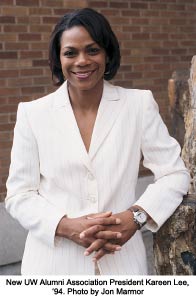The daughter of a career military man, Lee earned her undergraduate degree from the U.S. Military Academy at West Point, where she also was a track star. But after serving five years in the Army following graduation, she realized that she missed the Pacific Northwest and wanted to come home. She also wanted to switch gears and study law. She set her sights on the UW School of Law.
“I knew the UW was the place for me,” Lee says. “I wanted to come back to the Pacific Northwest to go to school, and the UW is the highest ranked school. It was just what I was looking for.”
 Lee, who earned her law degree from the UW in 1994, has come home in another way. This fall, she assumes the presidency of the 52,000-member UW Alumni Association.
Lee, who earned her law degree from the UW in 1994, has come home in another way. This fall, she assumes the presidency of the 52,000-member UW Alumni Association.Lee, director of gas operations for Puget Sound Energy, has big plans for the upcoming year. “My goal is to increase connectivity, especially with groups we haven't reached out to before,” she says. “We need to do a better job of reaching young alumni and minority communities, as well as solidify our relationship with the UW Bothell and UW Tacoma campuses.
“We are in a unique position because so many UW graduates stay here,” Lee says. “The UW means a lot to me, and really enjoy community involvement. I feel a strong attachment to the UW and education in general.”
Lee, who graduated from Clover Park High School in Tacoma in 1982, was a member of her school's state champion girls basketball team. At West Point, she broke the academy record in the 400-meter dash, and she set other individual and team track records that still stand today.
Although women had been attending West Point since 1976, some cadet companies there had never graduated a woman when she arrived at the academy in 1982. During her tenure, gradual integration began to happen, and when she graduated in 1986 with a degree in science and a concentration in Russian, the population of female cadets stood at 9 percent.
When Lee arrived at the UW for law school, she was determined to do things differently than she had done at West Point. She got involved in student politics, serving as a lobbyist for and then president of the Graduate and Professional Student Senate (GPSS). “At West Point, my only activity had been athletics,” Lee says. “At the UW, I was determined to branch out and get involved in other ways.” She worked closely with then-ASUW presidents Heidi Wills, '99, and Judy Nicastro, '94, '97, and former UW President William Gerberding.
Proving her ability as a visionary, she helped secure health benefits for teaching assistants and resident advisers. She also was involved in the Faculty Senate, the President's budget committee, and Chimera, a forum in which graduate students had the opportunity to display the results of their research at the HUB.
Lee met her husband Robert, '03, during graduate school. Robert, the director of the ASUW Experimental College, and Karen both had offices in the HUB when Karen worked for the GPSS. After meeting Karen, Robert told a friend, “I am going to marry that girl,” and in 1993, they indeed did wed. They have two children, Marshall, 9, and Mariah, 7.
Lee, whose first job out of law school was working for prestigious Seattle law firm Preston Gates & Ellis, was recruited to join the UWAA as a volunteer by Sheila Manus Vortman '69, '85, a former UWAA president. Lee served on the UWAA House Committee before joining the Board of Trustees in 2001 as an at-large member. She then served as vice president and president-elect. She succeeded Dawn Williams, '88, as president in August.
And she is ready to take on the task of working to making the UW Alumni Association even stronger. “We have a real challenge ahead,” Lee says. “People's lives are busier and they are less likely to join a membership organization. We have to find a way to overcome that. But we are in a unique position to reach out and make it happen.”